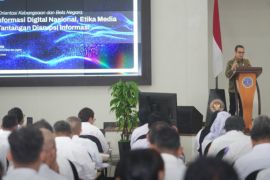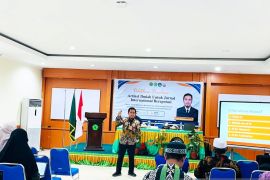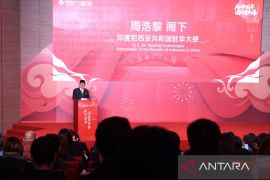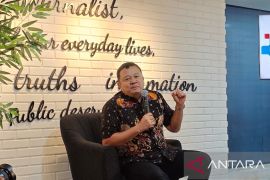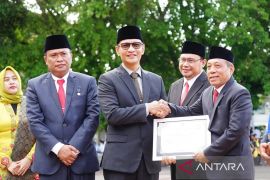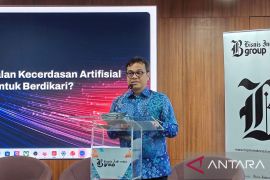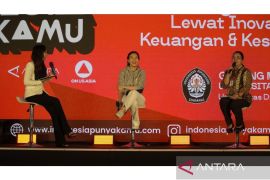
and opportunities for businesses

Jakarta (ANTARA) - Digital technology has undeniably revolutionized the way businesses in Indonesia operate.
Navigating AI: Challenges
Take, for instance, the dining industry, where waiters no longer take orders and record them on paper manually.
A simple QR code placed on tables has transformed the entire process, from menu browsing to payment.
What's more, with just a few taps on their devices, people can now effortlessly shop for a wide range of products, eliminating the need for time-consuming and costly trips to traditional stores.
These are just a few examples of how technology is reshaping the business landscape and consumer behavior.
Understanding consumer preferences is crucial for business success in today's competitive marketplace.
According to co-head of Asia-Pacific technology, media, and telecommunications equity research at JP Morgan, Alex Yao, artificial intelligence (AI) will be the key driver of consumer behavior and corporate activities in the coming years.
AI empowers businesses to collect, process, and analyze vast amounts of data, leading to deeper understanding of customer preferences and market trends.
This enables companies to make data-driven decisions, personalize marketing campaigns, and optimize operations.
Pavel Yurovitsky, CEO of digital marketing agency KIT Global, revealed that in the current digital era, companies everywhere are being forced to rethink traditional sales strategies.
Amid inflation, slower growth, and shifting consumer demands, businesses across Southeast Asia—especially those in Indonesia—are increasingly turning to AI to reshape their digital marketing strategies, streamline operations, optimize costs, and enhance customer engagement, he noted.
From AI-powered chatbots to personalized product recommendations, the applications of AI are diverse and far-reaching.
The economic landscape is pushing businesses to find cost-effective solutions while AI is helping them deliver results without overspending, Yurovitsky said.
Recent case studies have showcased the immense potential of AI-driven marketing, with some businesses reporting a staggering 547-fold increase in website traffic and a 50-percent surge in conversion rates, according to KIT Global.
In another example, a major retail brand in Indonesia has successfully wielded AI to optimize its advertising campaigns, achieving significant cost savings without compromising customer reach.
However, based on his team's research, Yurovitsky noted that AI adoption in Indonesia is still in the experimental stage.
"Although the MMA Indonesia Report indicates that Indonesian businesses are confident in AI's potential, they remain hesitant due to several challenges," he said.
One major obstacle is difficulty in selecting the right tools due to lack of understanding about AI implementation. Additionally, the perceived high cost of AI and automation solutions is another barrier for many businesses.
The Indonesian government is well aware of the challenges and opportunities facing the business world in the digital era.
As former minister of communication and informatics, Budi Arie Setiadi, said on September 28, 2024, AI's contribution to the Indonesian economy is projected to reach US$366 billion by 2030.
This sector will drive Indonesia's future economic growth, increase economic productivity through automation and innovation, and empower micro, small, and medium enterprises (MSMEs) to compete in the digital age, the minister said.
However, limited funding and uneven infrastructure development, which hinder essential Internet penetration for AI growth, remain significant challenges. Furthermore, lack of knowledge transfer from AI-developing countries is limiting the establishment of effective AI governance.
According to Bagus Chandra Wibawa, IT project manager at Bank Negara Indonesia (BNI), finding talents who not only understand the theory but can also apply AI technology to real-world projects is also a challenge.
AI does not automate businesses entirely. It requires a combination of technical skills and business acumen. Therefore, Wibawa emphasized the importance of industry-academia collaboration to bridge the talent gap as AI technology has also undoubtedly raised concerns about potential job displacement.
As AI becomes increasingly sophisticated, it can automate tasks previously performed by humans, which can lead to job losses in various sectors.
Therefore, governments and businesses have a crucial role to play in providing education and training programs to equip workers for the jobs of the future as such rapid technological transformation must be balanced with industry and human resource readiness to maintain relevance and competitiveness in the digital era.
To address this challenge, the government has partnered with technology giant Nvidia and telecommunications company Indosat Ooredoo Hutchinson to establish an AI development center in Solo Techno Park, Central Java.
This initiative, valued at US$200 million, aims to accelerate AI innovation in IndonesiaNvidia CEO Jensen Huang visited Indonesia on November 14 and delivered the keynote speech at the Indonesia AI Day event in Jakarta.
Baca juga: Pemerintah kejar potensi pajak dari ekonomi bawah tanah
During his visit, Huang discussed AI and its potential impact on Indonesia. He also spoke with President Prabowo Subianto, who had just landed in Peru to attend the Asia-Pacific Economic Cooperation (APEC) Summit in Lima, via video call and expressed his commitment to collaborating with Indonesian firms to develop AI technology.
During the call, Prabowo emphasized Nvidia's importance to Indonesia's future, highlighting the transformative potential of AI. He also invited Huang for a face-to-face meeting in the future, saying that Indonesia is eager to welcome Nvidia as a partner.
Huang's visit signifies the growing importance of AI in Indonesia and highlights the potential for collaboration between global tech giants and local businesses to drive innovation and economic growth.
Baca juga: Support creative economy as new engine of growth: minister
While the future of Indonesian business is inextricably linked to AI, embracing this technology can unlock new opportunities for businesses to drive growth and stay ahead of the competition. Navigating the challenges and ethical implications of AI is also crucial to ensure a sustainable and beneficial future.
Pewarta : Aditya Eko Sigit Wicaksono
Editor:
I Komang Suparta
COPYRIGHT © ANTARA 2026

